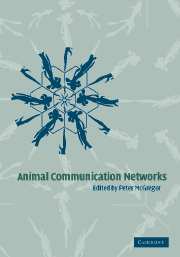Book contents
- Frontmatter
- Contents
- List of contributors
- Preface
- 1 Introduction
- Part I Behaviours specific to communication networks
- Part II The effects of particular contexts
- Introduction
- 7 Enlightened decisions: female assessment and communication networks
- 8 Predation and noise in communication networks of neotropical katydids
- 9 Nestling begging as a communication network
- 10 Redirection of aggression: multiparty signalling within a network?
- 11 Scent marking and social communication
- Part III Communication networks in different taxa
- Part IV Interfaces with other disciplines
- Index
7 - Enlightened decisions: female assessment and communication networks
Published online by Cambridge University Press: 06 August 2010
- Frontmatter
- Contents
- List of contributors
- Preface
- 1 Introduction
- Part I Behaviours specific to communication networks
- Part II The effects of particular contexts
- Introduction
- 7 Enlightened decisions: female assessment and communication networks
- 8 Predation and noise in communication networks of neotropical katydids
- 9 Nestling begging as a communication network
- 10 Redirection of aggression: multiparty signalling within a network?
- 11 Scent marking and social communication
- Part III Communication networks in different taxa
- Part IV Interfaces with other disciplines
- Index
Summary
Introduction
Asymmetry in parental investment often predicts that females should be choosier about prospective mates than males. It is commonly assumed that females assess male characteristics during mate choice, but which traits are assessed, and how they influence female decision making, is not well understood. Current models of mate choice suggest females may sequentially sample a pool of males, memorizing levels of trait expression among comparison males, or else accept the first male that exceeds some minimum threshold value of mate quality. Recent tests of communication network theory suggest that these models may have to be revised because females can tap into advertising signals broadcast in a network fashion. Such behaviour could reduce costs of mate searching, as signals are perceived simultaneously, allowing instantaneous relative comparisons. In this chapter, we explore the potential of females to extract comparative information on the relative quality of males for use in reproductive decision making. We focus primarily on primary mate choice decisions (i.e. initial selection of a mating partner) and secondary mate choice decisions (i.e. mating decisions that arise after social pairing, which may include extra-pair copulations or ‘divorce’ of the current mate to pair with another male) based on acoustic signals in territorial passerines; however, the ideas that we present should be applicable to other taxa and other sensory modalities. Finally, we discuss the potential impacts of habitat alteration on females' abilities to use network assessments for mate choice.
- Type
- Chapter
- Information
- Animal Communication Networks , pp. 133 - 151Publisher: Cambridge University PressPrint publication year: 2005
- 16
- Cited by



